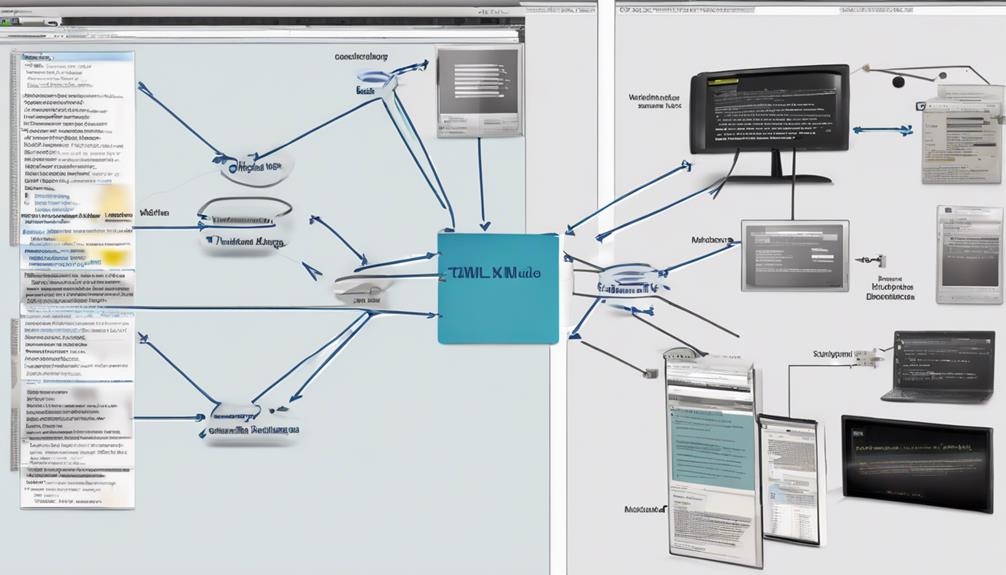When it comes to optimizing your data management strategies, prioritizing XML conversion services is a decision that can significantly impact your organizational efficiency and data handling capabilities. From ensuring data accuracy to enhancing data accessibility, the benefits of XML conversion go beyond just data organization. By diving into the realm of XML transformation, you’ll unlock a multitude of advantages that can revolutionize the way your organization interacts with and utilizes its valuable data resources. Let us explore the key reasons to prioritize XML conversion services.
Role of XML Conversion
Are you looking to streamline your data management processes and enhance accessibility? The role of XML conversion services is crucial in achieving these goals. By converting your documents into the XML standardization format, you can ensure consistency and compatibility across various systems and platforms. XML standardization allows for structured data that is easily searchable and retrievable, making it simpler to manage and analyze large volumes of information.
Document formatting is another key aspect of XML conversion. Through this process, your documents are transformed into a structured format that follows specific rules and guidelines. This ensures that your data is organized in a way that is logical and easy to navigate. Additionally, document formatting in XML allows for the creation of custom stylesheets, enabling you to present your information in a visually appealing and user-friendly manner.
XML Data Management
Efficient XML data management is essential for optimizing your document handling processes and maximizing the utility of your information resources. When it comes to data security, utilizing XML format allows for encryption, access control, and secure sharing of information. By managing your data in XML, you can ensure that sensitive information is protected from unauthorized access, reducing the risks of data breaches and compliance issues.
Moreover, XML data management enhances efficiency optimization by enabling seamless integration with various applications and systems. This interoperability streamlines workflows, automates processes, and facilitates data exchange within your organization. With XML, you can easily retrieve, update, and share structured data, improving collaboration and decision-making processes.
XML in Business Operations
Looking to enhance your business operations? Incorporating XML into your processes can significantly boost business efficiency and streamline information organization. XML, or Extensible Markup Language, offers a structured way to store and transport data, making it easier for businesses to manage and manipulate vast amounts of information effectively.
By utilizing XML in your business operations, you can improve efficiency through standardized data formats. This enables seamless data exchange between different systems and applications, reducing errors and increasing productivity. Additionally, XML allows for better organization of information by categorizing data into hierarchical structures, making it simpler to retrieve and analyze critical data when needed.
Integrating XML into your business operations can lead to smoother workflows, better decision-making, and enhanced collaboration among team members. With the ability to store and transfer data in a structured format, you can optimize processes and ensure that information is easily accessible and well-organized for improved business performance.
XML Conversion for Data Accessibility
Looking to enhance data accessibility and improve search functionality within your organization? XML conversion services can be the key to achieving these goals efficiently. By converting your data into XML format, you can make information more readily available and structured for easier retrieval, ultimately streamlining your operations.
Enhanced Data Accessibility
With the increasing digitalization of data, businesses and organizations are constantly seeking ways to enhance their data accessibility. Through XML conversion services, you can significantly improve data organization and file compatibility, making it easier for you and your team to access, retrieve, and utilize information efficiently. By converting your data into XML format, you ensure that it is structured in a standardized way, allowing for seamless integration and sharing across different platforms and systems.
Enhanced data accessibility not only streamlines your internal processes but also enables better collaboration and decision-making. With XML conversion, you can break down data silos and enable smooth communication between various departments within your organization. This enhanced accessibility to structured data can lead to improved productivity, better insights, and ultimately, enhanced business performance.
Investing in XML conversion services is a proactive step towards optimizing your data accessibility, ensuring that you have the right tools and systems in place to harness the full potential of your information assets.
Improved Search Functionality
To truly maximize the benefits of XML conversion services for data accessibility, consider the significant impact on search functionality. By implementing search optimization techniques during the XML conversion process, you can greatly enhance the user experience when accessing and retrieving information. Through meticulous metadata tagging and content organization within XML files, relevant data becomes easily searchable, leading to quicker access to specific details and a more efficient overall search experience.
Improving search functionality through XML conversion not only streamlines information retrieval but also boosts productivity by saving time that would otherwise be spent sifting through unorganized data. With structured metadata and organized content, users can locate the exact information they need promptly, enhancing their overall satisfaction with the data accessibility process.
Incorporating search optimization techniques into XML conversion services is a strategic way to prioritize user experience and ensure that data is easily navigable and searchable. By embracing metadata tagging and content organization, you can transform your data accessibility into a seamless and efficient process, ultimately enhancing the overall usability of your information resources.
Ensuring Data Accuracy
When it comes to XML conversion services, ensuring data accuracy is crucial for the success of your projects. Maintaining data integrity is key to ensuring that your information is reliable and trustworthy. By utilizing accuracy validation methods, you can guarantee that your converted XML data is error-free and meets the highest quality standards.
Data Integrity Importance
Ensuring data accuracy is paramount in any XML conversion process. When converting data into XML format, maintaining the integrity of information is crucial for its usability and reliability. Data security plays a significant role in this process, ensuring that sensitive information is protected throughout the conversion. By prioritizing data integrity, you can safeguard against potential data breaches or unauthorized access to critical information.
Additionally, proper file organization is essential for ensuring data accuracy during XML conversion. Well-structured files help in preserving the original data hierarchy and relationships, enabling seamless navigation and retrieval of information post-conversion. This organized approach not only enhances the efficiency of data management but also contributes to the accuracy of the converted XML files.
Accuracy Validation Methods
Maintaining data accuracy during XML conversion requires robust validation methods to ensure the integrity of information remains intact. Utilizing advanced validation techniques is crucial in guaranteeing that the converted data is error-free and aligns with the original content. Quality assurance plays a pivotal role in this process by implementing systematic checks and balances to validate the accuracy of the XML conversion.
XML Conversion Impact
Considering the significant impact that XML conversion can have on your business operations, it is crucial to understand the various ways in which this process can streamline your data management and enhance overall efficiency. Here are key points outlining the impact of XML conversion:
- Cost Benefits: By converting your data to XML format, you can significantly reduce costs associated with manual data entry and processing. This efficiency leads to cost savings in the long run.
- Industry Standards: XML conversion ensures that your data complies with industry standards, making it easier to exchange information with partners, clients, and regulatory bodies seamlessly.
- Improved Searchability: XML conversion enhances the searchability of your data, allowing for quick retrieval and analysis of information, which can boost decision-making processes.
- Enhanced Data Security: Converting data to XML format enables you to implement robust security measures, safeguarding your information from unauthorized access or breaches.
XML Conversion for Data Integration
Looking to streamline your data integration processes? Consider utilizing XML conversion for efficient data transformation and seamless integration solutions. XML conversion plays a crucial role in enhancing data integration by converting diverse data formats into a standardized XML format that can be easily integrated across different systems and platforms.
By converting data into XML format, you can simplify the process of data transformation, making it easier to map, transform, and integrate data from various sources. This standardized format ensures consistency and compatibility, enabling smooth data exchange and interoperability between different applications and databases.
Moreover, XML conversion facilitates the implementation of integration solutions such as APIs, web services, and middleware, allowing for real-time data exchange and automation of processes. This not only improves operational efficiency but also enhances data accuracy and reliability across your organization.
Incorporating XML conversion into your data integration strategy can significantly streamline your processes, increase productivity, and drive better decision-making through access to accurate and integrated data.
Frequently Asked Questions
How Can XML Conversion Services Improve Data Security?
By converting data to XML, you’re like wrapping it in a secure digital vault. XML conversion services enhance data security through encryption, ensuring compliance with strict measures. Your information stays safe, shielded from prying eyes.
What Are the Common Challenges of XML Data Integration?
When tackling XML data integration, common challenges you may face include data mapping complexities and finding suitable integration solutions. Navigating these obstacles effectively can streamline your processes and enhance the efficiency of your data management system.
Can XML Conversion Enhance Data Searchability and Retrieval?
Want to turbocharge your data searchability? XML conversion can help! By converting to XML, you’ll enjoy improved efficiency in data retrieval and enhanced organization. Say goodbye to tedious searches and hello to streamlined data management!
Are There Specific Industries That Benefit Most From XML Conversion?
In various industry applications, XML advantages shine bright. Sectors like publishing, finance, and healthcare benefit greatly from XML conversion. It streamlines data management, enhances interoperability, and boosts overall efficiency. Embrace XML for optimal results!
How Does XML Conversion Streamline Data Migration Processes?
Imagine XML conversion as a magic wand for data. It transforms information seamlessly, optimizing efficiency, ensuring system compatibility, and automating processes. Your migration journey becomes a smooth sail, thanks to this powerful tool.



